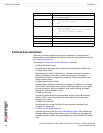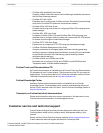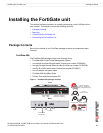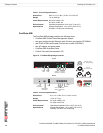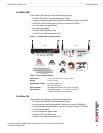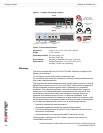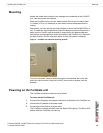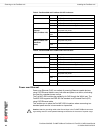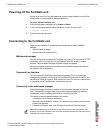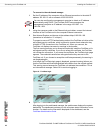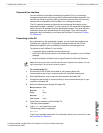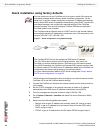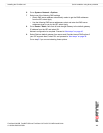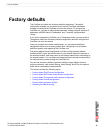
FortiGate-50A/50B, FortiWiFi-50B and FortiGate-100 FortiOS 3.0 MR4 Install Guide
20 01-30004-0265-20070831
Powering on the FortiGate unit Installing the FortiGate unit
Table 5: FortiGate-50A and FortiGate-100 LED indicators
Table 6: FortiGate-50B and FortiWiFi-50B LED indicators
Power over Ethernet
Power over Ethernet (PoE) is a method of powering Ethernet capable devices
using CAT5 Ethernet cable to carry both data and power to a device, eliminating
the need for a standard power source.
The FortiWiFi-50B includes the availability for PoE through the WAN1 port. The
FortiWiFi-50B supports the IEEE 802.3af standard as a Powered Device (PD)
using CAT5 Ethernet cable.
This enables you to place the FortiWiFi-50B in locations where connecting to a
standard power source is inconvenient or impractical.
LED State Description
Power Green The FortiGate unit is powered on.
Off The FortiGate unit is powered off.
Status Flashing The FortiGate unit is starting up.
Off The FortiGate unit is running normally.
Internal
External
DMZ (FortiGate-100)
Green The correct cable is in use, and the connected
equipment has power.
Flashing
green
Network activity at this interface.
Off No link established.
Internal External
DMZ (FortiGate-100
interfaces
(back)
Green The correct cable is in use, and the connected
equipment has power.
Flashing
amber
Network activity at this interface.
Off No link established.
LED State Description
Power Green The FortiGate unit is powered on.
Off The FortiGate unit is powered off.
Status Flashing The FortiGate unit is starting up.
Off The FortiGate unit is running normally.
WLAN (WiFi-50B) Green Wireless port is up.
Off Wireless port is down.
Link/Activity Green The correct cable is in use, and the connected
equipment has power.
Flashing
green
Network activity at this interface.
Off No link established.
10/100 Green The interface is connected at 100 Mbps.
!
Caution: Attach a grounding cable to the Ground input in the FortiWiFi-50B and connect to
a grounding source to avoid potential damage to the device in the event of a power surge.



